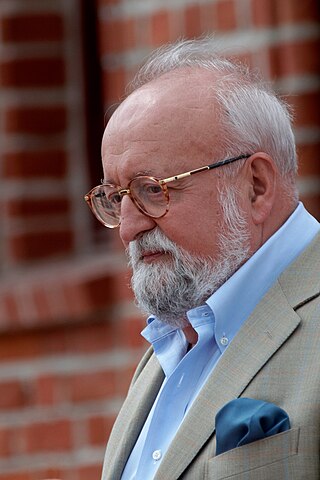
Krzysztof Eugeniusz Penderecki was a Polish composer and conductor. His best-known works include Threnody to the Victims of Hiroshima, Symphony No. 3, his St Luke Passion, Polish Requiem, Anaklasis and Utrenja. His oeuvre includes four operas, eight symphonies and other orchestral pieces, a variety of instrumental concertos, choral settings of mainly religious texts, as well as chamber and instrumental works.

Antoni Wit is a Polish conductor, composer, lawyer and professor at the Fryderyk Chopin University of Music. Between 2002 and 2013, he served as the artistic director of the Warsaw National Philharmonic Orchestra.

Polish Requiem, also A Polish Requiem, is a large-scale requiem mass for soloists, mixed choir and orchestra by the Polish composer Krzysztof Penderecki. The Lacrimosa, dedicated to the trade union leader Lech Wałęsa, was written for the unveiling of a statue at the Gdańsk Shipyard to commemorate those killed in the Polish anti-government riots in 1970. He expanded the work into a requiem, writing other parts to honour different patriotic events over the next four years.

The Symphony No. 3 is a symphony in five movements composed between 1988 and 1995 by Krzysztof Penderecki. It was commissioned and completed for the centenary of the Munich Philharmonic. Its earliest version, Passacaglia and Rondo, premiered at the International Music Festival Week in Lucerne, Switzerland, on August 20, 1988. It was performed by the Lucerne Festival Orchestra and conducted by Penderecki. The full symphony premiered in Munich on 8 December 1995, performed by the Munich Philharmonic, again conducted by the composer.

Krzysztof Penderecki wrote his Seventh Symphony, subtitled "Seven Gates of Jerusalem", in 1996 to commemorate the third millennium of the city of Jerusalem. Originally conceived as an oratorio, this choral symphony was premièred in Jerusalem in January 1997; it was only after the first Polish performance two months later that Penderecki decided to call it a symphony. It is written for two sopranos, alto, tenor, bass, narrator, chorus and orchestra.

Anaklasis is a composition for 42 string instruments and percussion, composed in 1960 by the Polish composer Krzysztof Penderecki. It was first performed at the Donaueschingen Festival in 1960. At this first performance, it was well received by the audience who demanded an encore.

The Polish National Radio Symphony Orchestra is one of Poland's radio orchestras and premier musical institutions. It was founded in 1935 in Warsaw and was later re-established in Katowice in 1945. Since 2006 it has been a "National Cultural Institution".
Utrenja, alternatively spelled as Utrenia, Utrenya, or Jutrznia, and sometimes also translated as Matins, is a set of two liturgical compositions by Polish composer Krzysztof Penderecki. They were composed and premiered in 1970 and 1971.
Tatjana Vassiljeva is a Russian cellist with many prizes.
The Partita for Harpsichord and Orchestra, sometimes also referred to as Partita for Harpsichord, Electric Guitar, Bass Guitar, Harp, Double Bass, and Chamber Orchestra or Harpsichord Concerto, is a composition by Polish composer Krzysztof Penderecki. It was finished in 1971 and is Penderecki's only major composition for a harpsichord soloist.

The Symphony No. 1 by Polish composer Krzysztof Penderecki was composed in 1973. It was published by Polish Music Publishing House and Schott Music and has never been expanded or revised.
Fonogrammi, for flute and chamber orchestra, is a composition by Polish composer Krzysztof Penderecki. It was finished in 1961 and was published by Schott Music, even though it remained initially unpublished.
The Capriccio for Violin and Orchestra is a composition by Polish composer Krzysztof Penderecki. It is one of the five caprices that he composed and one of the two that he composed for a soloist with an orchestra, together with the Capriccio for Oboe and Eleven Instruments.
Canticum Canticorum Salomonis is a choral composition by Polish composer Krzysztof Penderecki. It was finished in 1973.
Emanations, also referred to by its original German title Emanationen or by its Polish title Emanacje, is a composition for two orchestras by Polish composer Krzysztof Penderecki. Composed in 1958, it is one of his early compositions.
The Clarinet Quartet, also known as Quartet for Clarinet and String Trio, is a work for clarinet, violin, viola, and cello by Polish composer Krzysztof Penderecki. It was finished in 1993.
Three Miniatures for Clarinet and Piano is an early work by Polish composer Krzysztof Penderecki. It was finished in 1956, but was premiered four years later.

Krzysztof Penderecki's setting of the biblical canticle Magnificat was commissioned for the 1,200th anniversary of Salzburg Cathedral and premiered there on 17 August 1974 under the composer's baton. It is a vast work, being scored for bass vocal soloist, boys’ voices, seven other men’s voices, two 24-part mixed choirs and orchestra.

Credo is a large-scale sacred composition for soloists, children's choir, mixed choir and orchestra by Krzysztof Penderecki, completed in 1998. It was commissioned by Helmuth Rilling for the Oregon Bach Festival, where it was first performed on 11 July 1998. Penderecki expanded the liturgical text by hymns and Bible verses in Latin, Polish and German. A recording won the 2000 Grammy Award for best choral performance.



